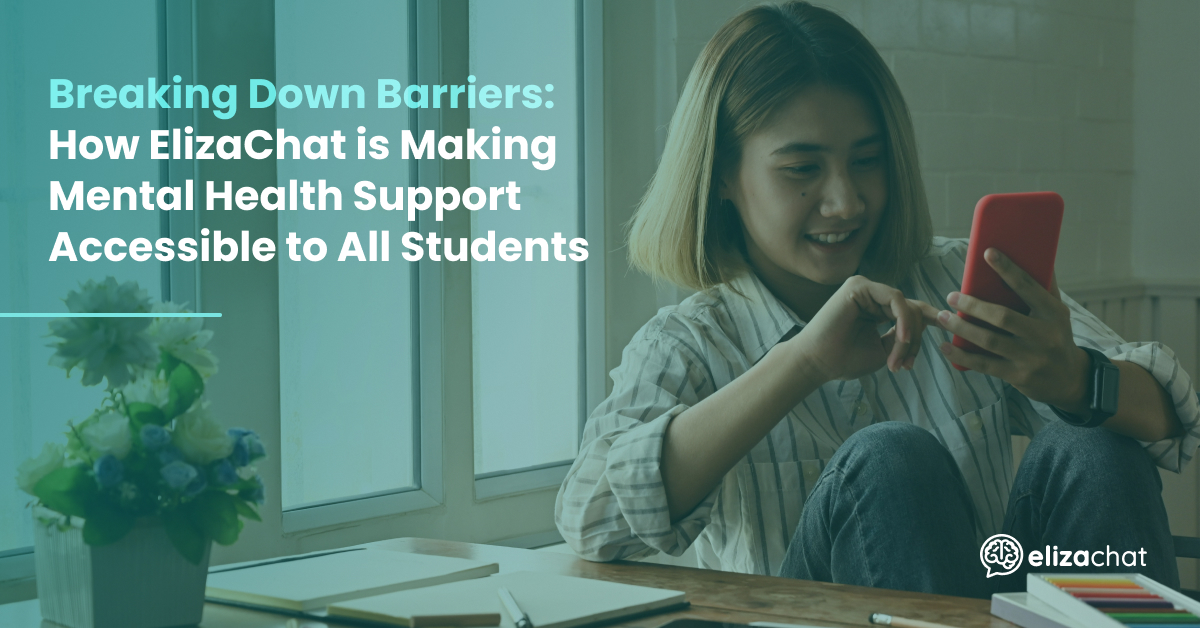Today’s students are facing unprecedented challenges to their mental health and well-being. The statistics are sobering. According to recent studies, up to 1 in 5 children aged 3-17 experience a mental, emotional, developmental, or behavioral disorder each year[1]. Yet, despite this growing need, many students find themselves without access to the support they desperately need. The reasons are many – from the stigma that still surrounds mental health issues to the severe shortage of mental health professionals in our schools.
Traditional methods of support need help to keep pace with the growing demand. But what if there was a way to break down these barriers? What if we could provide every student with access to mental health support anytime and anywhere they needed it?
ElizaChat addresses these challenges head-on. By leveraging the power of artificial intelligence and digital technology, we modernize how we approach student mental health support. It’s not just a tool – it’s a lifeline, a friend, and a guide, all rolled into one accessible, user-friendly platform.
In this blog post, we’ll explore the current landscape of student mental health, the barriers that prevent many from accessing the help they need, and how ElizaChat is working to break down these barriers. We’ll discuss why it’s more important than ever for schools to embrace innovative solutions like this.
The Current Landscape of Student Mental Health
The mental health landscape for students today is increasingly complex and challenging. Recent years have seen a significant rise in mental health issues among adolescents and teens, creating an urgent need for accessible support systems.
Rising Mental Health Concerns
Mental health issues have been on the rise among young people for some time. According to the CDC, between 2009 and 2019, the proportion of high school students reporting persistent sadness or hopelessness increased by 40%[2]. This trend shows no signs of slowing down, with more students than ever grappling with issues like anxiety, depression, and stress.
Shortage of Mental Health Professionals
The need for mental health support in schools has never been greater. However, schools are facing a significant shortage of mental health professionals. Recent studies show that schools only have about a third of the therapists they need[3]. This shortage is particularly acute in rural and underserved areas, where access to mental health resources is already limited[4].
According to the National Association of School Psychologists, the recommended ratio of school psychologists to students is 1:500. However, the national average is 1:1211, with some states reporting ratios as high as 1:5000[5]. This shortage means many students need more support during crucial developmental years.
Significant Barriers to Accessing Mental Health Support
Even when mental health resources are available, students often face significant barriers to accessing them:
- Stigma: Despite increasing awareness, mental health issues are still often stigmatized, preventing many students from seeking help[6][7].
- Financial Constraints: The high costs associated with mental health services can be prohibitive for many families, especially those without adequate insurance coverage[8].
- Time and Transportation Issues: Scheduling conflicts and lack of transportation can make it difficult for students to access traditional in-person therapy services, particularly in rural areas[4].
- Cultural Barriers: Lack of culturally competent care can discourage students from diverse backgrounds from seeking help[9].
The Need for Innovative Solutions
This challenging landscape underscores the urgent need for innovative, accessible mental health solutions to reach students where they are. Digital mental health platforms, like ElizaChat, are emerging as a promising approach to address these challenges, offering scalable, accessible support that can complement existing mental health resources in schools.
The Advantages of Digital Mental Health Solutions
Digital solutions like ElizaChat offer several advantages over traditional in-person therapy:
- Convenience and Accessibility: Students can access support anytime, anywhere.
- Personalized Interventions: AI technology allows tailored support based on each student’s unique needs.
- Complementing Traditional Therapy: ElizaChat works alongside existing mental health resources, providing additional support when in-person options are unavailable[10].
How ElizaChat is Breaking Down These Barriers
ElizaChat is revolutionizing student mental health support by addressing these barriers head-on:
- Reducing Stigma: By offering anonymous, 24/7 access, ElizaChat allows students to seek help without fear of judgment.
- Addressing Professional Shortages: Our AI-powered support system provides immediate assistance, complementing the work of school mental health professionals.
- Eliminating Financial Barriers: ElizaChat is a free resource for all students, regardless of their family’s financial situation.
- Providing Equal Access: As a digital solution, ElizaChat is accessible to students in all locations, including rural and underserved areas.
Ensuring Privacy and Building Trust
At ElizaChat, we understand the importance of privacy in mental health support. We are committed to maintaining student confidentiality and employing secure data-handling practices. This commitment to privacy helps build trust and encourages students to seek help when needed[10].
The Importance of Cultural Competency
The ElizaChat designs our technology with cultural competency in mind. We recognize students’ diverse backgrounds and tailor our support to be respectful of and responsive to cultural differences. This approach ensures that our support is adequate for all students, regardless of their cultural background[9].
Long-term Benefits of Improved Mental Health Access
By improving access to mental health support, ElizaChat aims to contribute to several long-term benefits for students:
- Better academic performance
- Reduced dropout rates
- Improved overall well-being extending into adulthood[11]
Conclusion
By breaking down barriers to access, providing personalized and culturally competent care, and ensuring privacy and trust, we’re working to ensure that every student has the support they need to thrive.
Are you an educator or school administrator interested in bringing ElizaChat to your students? Join our community today and be part of the movement to revolutionize student mental health support.
REFERENCES
- https://www.cdc.gov/childrensmentalhealth/features/kf-childrens-mental-health-report.html
- https://www.cdc.gov/healthyyouth/data/yrbs/pdf/YRBSDataSummaryTrendsReport2019-508.pdf
- https://www.washingtonpost.com/education/2023/08/31/mental-health-crisis-students-have-third-therapists-they-need/
- https://focus.psychiatryonline.org/doi/10.1176/appi.focus.20190028
- https://www.nasponline.org/research-and-policy/policy-matters-blog/shortage-of-school-psychologists-threatens-student-success
- https://www.ncbi.nlm.nih.gov/pmc/articles/PMC7275900/
- https://www.ncbi.nlm.nih.gov/pmc/articles/PMC5998799/
- https://www.medcentral.com/behavioral-mental/adolescent/barriers-to-treatment
- https://www.ncbi.nlm.nih.gov/pmc/articles/PMC1800843/
- https://www.psychology.org/resources/virtual-therapy-vs-in-person/
- https://www.cdc.gov/childrensmentalhealth/access.html
.svg)
